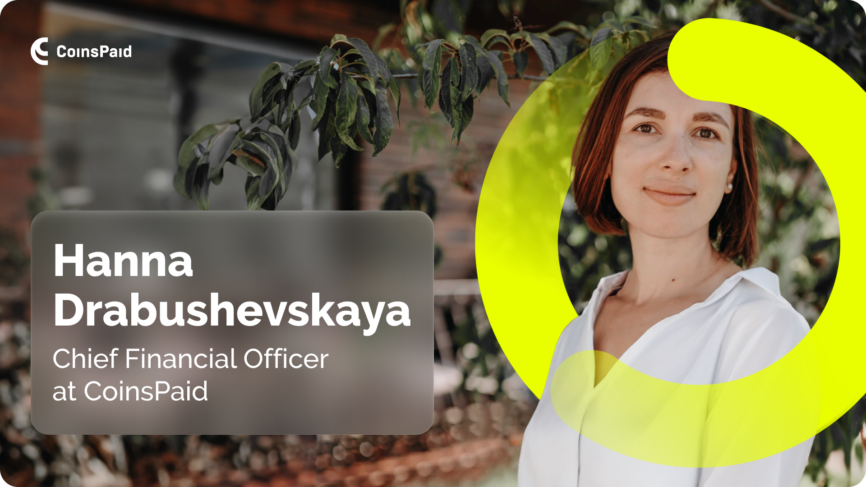The pivotal factor driving CoinsPaid’s financial success lies in the accuracy of data and the ability to utilise it

A robust financial department serves as the bedrock upon which companies like CoinsPaid build their success, orchestrating the intricate dance of fiscal responsibility, regulatory compliance, and strategic financial planning. Yet, behind the scenes of every thriving financial department lies a visionary leader, steering the team through challenges and opportunities with unwavering determination and expertise.
Join us as we delve into the world of CoinsPaid with Hanna Drabysheuskaya, the Chief Financial Officer. Follow her remarkable journey to the CFO role, and discover how she navigates the complexities of financial management, drives innovation, and fosters a dynamic team environment, propelling CoinsPaid towards continued growth and success. Hanna ensures a seamless integration of traditional financial practices with advanced technologies, contributing to CoinsPaid remaining at the forefront of the crypto payment gateway industry.
Additionally, gain insights into the biggest challenges currently facing the overall financial sector, as seen through her experienced lens
Tell us about your journey to becoming the CFO of CoinsPaid. What experiences or milestones led you here?
My journey to becoming the CFO is a narrative of growth, learning, and seizing opportunities as they arise, including those that come by chance. Despite initially obtaining an education in history rather than mathematics, I transitioned into a career path shaped by curiosity and a willingness to learn.
I began my career as a secretary, where I occasionally supported the accounting team. This experience ignited my interest in accounting, prompting me to enrol in accounting courses to deepen my understanding of the field. This decision opened doors to an opportunity at UPS, a courier delivery company, where I immersed myself in the intricacies of international accounting standards. However, I soon realised that the courses alone did not provide me with enough knowledge. It became clear that further education was necessary for a deeper comprehension of accounting. Therefore, I decided to pursue a second higher education.
There, I delved into financial analysis and graduated with honours. Later, I joined BDO, a consultancy firm, where I led a team of four specialising in outsourcing accounting services for a diverse range of international clients. My time at BDO was both challenging and rewarding, allowing me to gain valuable experience, knowledge, and professional growth. Working predominantly with foreign companies, I had the opportunity to interact with numerous CFOs, auditors, consultants, and tax inspectors. The demanding nature of the job meant working long hours, typically spanning 10 to 12 hours a day, as is customary in the outsourcing industry. Later I got married and moved to Russia, prompting a brief pause in my career.
Then, I joined a construction company. One day, the director absconded with the company’s funds. The company had to build a housing complex with 26 apartments, and we were left to solve the problem. We secured loans and even asked our two friends to secure loans, which served as the start-up funds for further construction. The first apartment was sold at a low price, but as prices became regulated, each subsequent apartment became more expensive. Eventually, the building was completed, and we even made a profit. I monitored everything, from supplies and marketing to placing ads on Yandex. Now I know what kind of armature is needed for the foundation, walls, and load-bearing walls. To sum up, I had to become a director and, at the same time, serve as an accountant and be responsible for finances.
After all of this, I realised that I no longer wished to work in Russia and sought out a less stressful job. Amidst the global upheaval caused by the COVID-19 pandemic, remote work emerged as a catalyst for reinventing myself. Eager for new horizons and a change of scenery, I became driven by a desire to broaden my professional horizons. It was during this time that I received a job proposal from my colleagues. Following a series of interviews, I embarked on a new role as an accountant at SoftSwiss. After three months there, I was approached about joining CoinsPaid as the chief accountant. However, the colleague who initially invited me abruptly resigned in a week, leaving me uncertain about their expectations and my responsibilities. My main goal was to navigate through the situation and find clarity.
Tell us a little about your main responsibilities as a CFO at CoinsPaid. What do you consider the greatest strength of a CFO in a fintech company and how does it help in the role?
Currently, I lead two departments: Finance&Accounting and Legal. These departments are responsible for ensuring that the company operates within the boundaries of applicable laws and regulations. This includes obtaining licences, undergoing various audits, and maintaining accurate financial records. Additionally, I’m responsible for managing the financial condition of the company and some operational processes.
Regarding the greatest strength, I would highlight multitasking and a helicopter view. At CoinsPaid, our teams exhibit a diverse range of expertise and functions, which can often be difficult to see the whole picture with connections between them. It’s imperative to discern and foster these interconnections among teams. When teams lack clarity on their interrelatedness, it can lead to inefficiencies. Each team member should have a clear understanding of their role in contributing to the company’s objectives and how their work intersects with others. It’s crucial to cultivate a holistic perspective and ensure that everyone comprehends their responsibilities and their impact on the broader workflow. Thus, multitasking and maintaining a helicopter view become essential for CFO
How has CoinsPaid’s financial department evolved?
When I joined the team, I assumed the role of the sole accountant, managing all responsibilities. However, as our operations expanded, it became evident that additional support was necessary. We subsequently recruited two more accountants to help alleviate the workload. Following our initial audit, it became clear that dedicated personnel were needed to liaise with auditors, particularly as our presence extended into regions such as Latam and Lithuania. As a result, we hired another team member exclusively focused on audit-related tasks.
As our operations continued to expand, especially with the establishment of our Estonian office and plans for further expansion into Lithuania and Poland, the need for additional accounting support became increasingly apparent. Consequently, we hired an additional accountant dedicated to our Estonian operations, further strengthening our team.
After dedicating six months to CryptoProcessing, it became apparent to me that the software had been developed by individuals lacking a solid foundation in financial accounting. This realisation led to numerous errors and inaccuracies. To rectify this issue, we hired a financial analyst to conduct thorough investigations into these discrepancies. Our team expanded to five members by the end of 2022.
Recognising the significance of integrating financial expertise into various aspects of our operations, particularly tasks assigned to our developers, we recruited a financial product business analyst. This individual plays a crucial role in creating tasks and schedules from a financial perspective, ensuring alignment with our overall financial objectives.
Currently, our finance department comprises nine individuals, each contributing their expertise to ensure the smooth functioning of our financial operations.
I was involved solely in forming the accounting and financial team. But, after assuming the role of СFO and with the departure of our Head of Legal, my colleague Valentyna Savchuk and I worked together to create a new structure for the entire department.
I also realised that I lacked a complete range of data for analysis, as I had no direct contact with clients. I termed this approach “3D analysis.” To enhance the understanding of our clients and their financial interactions with our company, I started working with a business analysis team. Tasked with tracking the entire lifecycle of both our companies and our clients from a financial and business perspective, this team plays a pivotal role in providing us with valuable insights into our company’s dynamic development. This initiative represents a significant focus for our business analysis team in 2024 as we strive to gain a comprehensive understanding of our company’s trajectory and optimise our operations accordingly.
What role do you believe the finance department plays in shaping and maintaining CoinsPaid’s culture?
CoinsPaid’s finance department plays a crucial role in promoting financial literacy across teams. They aim to educate team leaders and at least M-level managers on the intricacies of CryptoProcessing and other software, emphasising the importance of understanding these processes.
The CoinsPaid finance department organises training sessions for the entire company. For instance, we create instructional videos demonstrating our back-office setup on the accounting balance, providing insight into processing from a financial perspective.
Additionally, last year, we hosted a series of training sessions where teams from various departments were invited to share their experiences and insights. These sessions proved highly beneficial. For instance, when I joined CoinsPaid, I struggled to differentiate between LeadGen and Sales, but through these sessions, I gained clarity.
Overall, the finance department’s efforts not only foster financial understanding but also contribute to a cohesive and informed company culture at CoinsPaid.
In your view, which factor plays a more pivotal role in driving CoinsPaid’s financial success?`
The pivotal factor driving CoinsPaid’s financial success lies in the accuracy of available data and the ability to effectively utilise it, considering various factors. When our processing system operates smoothly, it transmits and accumulates precise data. This data allows us to conduct a thorough analysis and make informed decisions, not only from a financial perspective but also from a business standpoint. For instance, data indicating high client satisfaction with integration, user-friendly interfaces for end-users, and satisfactory transaction speeds are crucial. Such data enables us to understand how to enhance our product further
In your opinion, what are some of the biggest challenges currently facing the overall financial sector?
One of the biggest challenges currently facing the overall financial sector is the high cost of financial services, making them an expensive burden for end consumers. This is why cryptocurrencies are often considered popular alternatives, as they are cheaper compared to fiat currencies.
Another significant challenge is fraud. While financial institutions themselves may not always directly encounter fraud, the transparency of financial operations makes them an easy target for fraudsters. Therefore, prioritising security hygiene is crucial.
Personal financial literacy is also essential. Individuals need to be educated about financial matters to make informed decisions and protect themselves from scams.
To address fraud on a global scale, collaboration is key. It involves pooling knowledge, experience, and resources to enhance overall awareness. For instance, after experiencing a cyberattack, one of our competitors conducted a cleanup and realised they were also targeted by hackers. They managed to close the security gaps after learning from our incident. Sharing information about such incidents can help the industry collectively strengthen its defences against fraud.
What challenges and opportunities do you anticipate for CoinsPaid?
One of the primary challenges we’re currently navigating is the need to align our offerings with prevailing market trends. Cryptocurrencies are often perceived as cost-effective alternatives to traditional payment methods, posing a challenge for crypto payment providers like CoinsPaid. To remain competitive, we’re strategically addressing this by implementing measures to optimise our operational costs.
Cost optimization initiatives are central to our strategy. We’re exploring various avenues to reduce expenses, including streamlining mining fees, negotiating favourable terms with banking partners to minimise transaction costs, and automating internal processes to improve efficiency. By embracing automation, we aim to not only enhance operational speed but also reduce the potential for human error, thereby improving overall service quality.
Moreover, we’re evaluating our pricing structures to ensure they remain competitive in the market. This involves reassessing commission rates and exploring innovative pricing models to offer greater value to our clients while maintaining profitability. For instance, we’re considering the discontinuation of half-subscriptions for non-paid services to streamline our offerings and better align with customer needs.
While these challenges present significant hurdles, they also signify opportunities for growth and innovation. By proactively addressing cost optimization and refining our pricing strategies, we position ourselves to capture market share and expand our customer base. Additionally, our commitment to technological advancements, such as blockchain integration and enhanced security measures, opens doors to new revenue streams and strengthens our competitive edge in the evolving landscape of digital finance.



